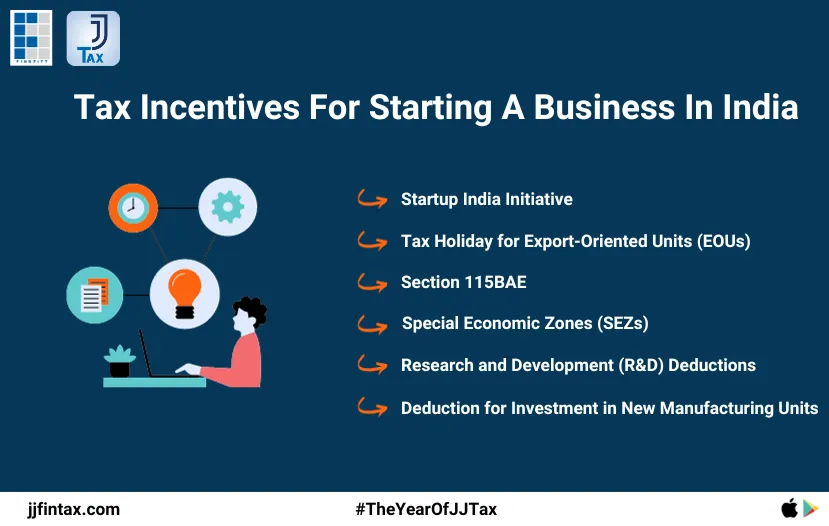Unlocking Opportunities: Navigating Tax Incentives for Entrepreneurship in India

In 2022, India climbed up 23 spots in the World Bank's ‘Ease of Doing Business’ rankings, showcasing a rapidly improving business environment. It's now easier than ever to start and grow your venture in India!
This newsletter could change your entrepreneurial journey forever! In the ever-evolving landscape of the Indian economy, opportunities abound for those daring enough to venture into the world of business.💼
As the landscape of the Indian economy evolves, the government continues to introduce various incentives to promote entrepreneurship and stimulate economic growth.💡
The Startup India initiative, launched by the Government of India, aims to foster innovation and encourage the growth of startups. Eligible startups can enjoy a host of benefits:
● Tax exemptions allowed to Eligible Startups under Startup India Program:
● 3-year tax holiday in a block of seven years provided the annual turnover does not exceed Rs. 25 crore in any financial year.
● Exemption from tax on Long-term capital gains is available when it is invested in a notified fund within six months form the date of transfer and maximum investment amount in the specified assets is Rs. 50 lakhs and investment must remain in the notified fund for three years
● Tax exemption on investments above the fair market value.
● Tax exemption to Individual/HUF on investment of long-term capital gain in equity shares of Eligible Startups u/s 54GB.
● Set off of carry forward losses and capital gains allowed in case of a change in Shareholding pattern.
● Startup with an Annual turnover below INR 2 crore can benefit from Presumptive Tax Scheme.
Export-oriented units engaged in manufacturing and trading activities can benefit from a tax holiday under Sections 10A and 10B of the Income Tax Act. This incentive allows businesses to enjoy a tax exemption on profits generated from exports for a specified period, typically up to 15 years.🌐
A new section 115BAE is proposed to be inserted, which provides for reduced rate of tax of 15% (plus surcharge of 10% and cess) for Manufacturing co-operative societies established on or after April 1st, 2023, and commencing production on or before March 31st, 2024 [provided that specified incentives or deductions are not availed].🏭
Businesses operating in Special Economic Zones are eligible for a range of tax incentives, including:
● Income Tax Exemption: Units operating in SEZs can claim a 100% income tax exemption on export profits for the first five years, followed by a 50% exemption for the next five years.
● Exemption from Minimum Alternative Tax (MAT): MAT is not applicable to SEZ units, offering further relief to businesses within these zones.
To encourage innovation, businesses engaged in R&D activities can claim a weighted deduction of up to 100% of the expenses incurred on qualifying R&D projects.🔬
Under Section 35AD, businesses investing in new manufacturing facilities are eligible for a deduction of 100% of the capital expenditure incurred on eligible projects.
Remember, while these incentives can significantly reduce your tax liability, it's crucial to understand the eligibility criteria, documentation requirements, and compliance procedures associated with each benefit.
At Uniqey by JJ Tax, we're dedicated to helping you navigate the complex landscape of tax incentives for starting and growing your business. Our expert team is well-versed in the latest regulations and can provide tailored advice to maximize your benefits.🤝
If you're considering starting a business or have questions about these tax incentives, don't hesitate to reach out to us. We're here to support your journey towards entrepreneurial success. Book a FREE 15-minute consultation.

